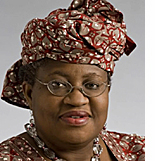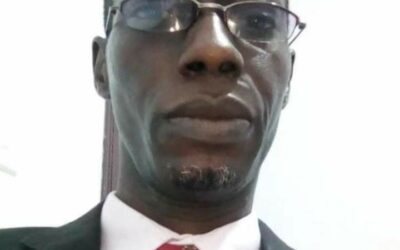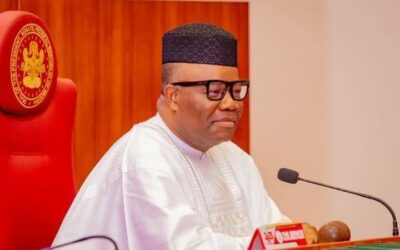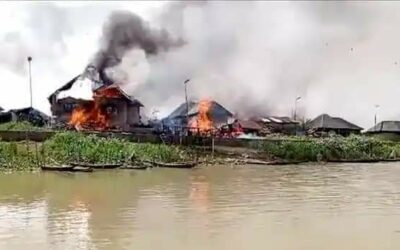By Omodele Adigun, Louis Iba, Adewale Sanyaolu and Chima Nwokoji
The SUN Monday, September 19, 2011
The alarm sounded last week by the Minister of Finance, Dr (Mrs) Ngozi Okonjo-Iweala, on the zero-level implementation of the 2011 Budget has again brought to the fore the problem of poor budget implementation in the country.
According to her, the N4.6 trillion budget has run into serious hitch and, as things stand now, no one could actually ascertain the level of implementation of the budget because there was no record of such three months to the end of the year. Nothing could be more distressing than this.
This is coming at a time the Presidential Projects Assessment Committee (PPAC) disclosed that there are about 11,886 on-going and abandoned projects that would cost at least N7.78trillion to finance. All across the various sectors of the economy what stares one in the face is poor budget implementation. From the road sector to aviation, energy and housing delivery, the situation is the same.
Many people have blamed this on the lopsided nature of the budget where recurrent expenditure is allocated 70 per cent of the resources, while the capital took only about 30 per cent.
Again, despite the colossal sums sunk into capital projects particularly in the power sector, infrastructure there remains as deplorable as ever and getting seamless electricity supply is a nightmare in the country.
The sector is reported to have got the highest awards of 6o contracts, worth N241, 788,441,596.58 yet the country cannot boost of 4000 megawatts of power generation. For instance, Nigerians cannot honestly say that they have felt the impact of the huge sum earmarked for the energy sector, at least not in the electricity industry where power generation and supply has remained abysmally poor.
In the 2011 Appropriation Act, Jonathan’s government budgeted N91billion for the sector, out of which N63billion went to PHCN and N686 million to the National Rural Electrification Agency.
The aim is to strengthen the infrastructure owned by the state-owned firm and keep workers going. It was also meant to boost the supply of electricity to rural areas.
Having launched the Power Sector Roadmap which sought to deregulate the generation and distribution units for private sector investors, the government had taken a step further to put in place a N500billion intervention fund for the power sector via the CBN to refinance loan facilities at single digit interest rates. Private investors were to tap into this fund for projects in the sector.
Pooling funds from the budget and other intervention funds, the government had hoped that it could attain at least 5,000megawatts electricity generation from the resuscitation of existing power plants as well as bringing on stream the new plants kick-started by the Olusegun Obasanjo’s administration. Sadly, with the third quarter of the year coming to a close, that aspiration, remains at best a fantacy – there are no clear signs of it becoming reality.
What about the N50 billion set aside for job creation in the budget? It seems the money has missed the road as about 32.5 million Nigerians remain unemployed, according to the latest figure from National Bureau of Statistics (NBS). And Nigeria continues to slide in the Human Development Index as latest figure shows that the country ranks 142 out of 174 poorest nations in the world. Another fallout of poor budget implementation.
The 358 projects for which contracts were awarded by the Federal Executive Council in just a year cut across various sectors of the economy including oil and gas, construction, health, industries, water supply, transportation, roads, housing etc.
A latest report has it that the N5.93 trillion allocated to the three tiers of government, Ministries, Departments and Agencies (MDAs), during the first seven months of this year, has not reflected in the level of infrastructure delivery in the education and healthcare sectors, among others. That is not all. The Senate is reportedly looking into the allegations of reckless extra-budgetary funding of subsidies for petroleum products for the year 2011.Information available to the Senate is said to have revealed that N240 billion was earmarked as subsidy for petroleum products in the 2011 Appropriation Act, but, a total of N931 billion has so far been expended as at August 2011.
This coming on the heels of lamentations by the Manufacturers’ Association of Nigeria (MAN) that a $500 million US facility appropriated for Small Medium Enterprises (SMEs) in the 2011 budget is yet to be disbursed to the beneficiaries less than three months to the close of 2011. This is a big headache for Mrs Okonjo-Iweala, the Coordinator of the Economy , who recently canvassed that the nation needs to diversify away from oil, reduce public spending, boost job creation and finish failing infrastructure projects.
How can diversification and job creation be feasible when the laws guiding budgetary provisions and disbursement in the country stipulate that if the facility meant for this engine of growth is not disbursed to the final beneficiaries- the SMEs- by October ending, the funds will revert to the Federal treasury?
Bemoaning the situation, Mr. John Aluya, the MAN chairman for Apapa Branch, stated that the Minister of National Planning had come out to tell the manufacturers that the Federal Government has challenges implementing the 2011 budget.
“But despite his explanation my worry stemmed from the fact that government has been unable to tell us in the manufacturing sector and by extension Nigerians what those challenges are,” he said. Besides, he opined that if the fund had been made available to the SMEs, it would have gone a long way to boost production as well job creation, thereby supporting the efforts of government in reducing unemployment rate.
He added:“You know in government, funds are made available to each sector based of availability of resources. SMEs got this much in 2011 because there is fund and provision for it. But same cannot be said of 2012 as a result of dwindling resources at the disposal of government.” From the foregoing, it begins to be crystal clear: that description by an analyst that the 2011 Federal Government budget is not inspiring and full of rhetoric which Nigerians have been fed with over the years.
This economist had then cast doubt on the contents of the Budget speech of President Goodluck Jonathan at the National Assembly last December. To him, there was poor implementation of the 2010 budget akin to what had been experienced in previous years. He wonders what would make the 2011 different. It will be recalled that when the president was presenting the Budget proposal he had said that the “Budget Proposal is underpinned by four pillars that are drawn from our Economic Growth Strategy. These are to foster inclusive growth and job creation; optimise capital spending by rationalising recurrent expenditure and maximising Government’s revenues; accelerate the implementation of reforms to enhance the quality and efficiency of public expenditure; and reinstate greater prudence in the management of the nation’s financial resources.” On the 2010 Budget, he said that “a total of N749.75billion had been cash-backed for capital expenditure as at the end of October through the first, second and third quarter capital releases. With the fourth quarter releases shortly to be implemented, a total of N900billion will have been released.
This would compare favourably with any level of capital implementation ever achieved in a 12-month fiscal year. While capital performance varies across the MDAs, the average capital utilisation is just under 50% as at the end of October.” The 2011 Budget is predicated on improvements in domestic oil production, stability in the international oil markets and sustained economic growth.
These include:
- Oil production of 2.3million barrels per day
- Benchmark oil price of $65 per barrel
- Exchange rate of N150 per dollar
- Joint Venture cash calls of $5.4billion
- Projected GDP growth rate of 7 per cent
Projected revenue and expenditure
Aggregate expenditure for 2011 is projected at N4,226.19 billion, comprising N196.12 billion for Statutory Transfers, N542.38billion for Debt Service, N2,481.71billion for Recurrent (Non-Debt) Expenditure and N1,005.99billion for Capital Expenditure. This represents a 18.1 per cent contraction from the N5,159.66 billion appropriated by the 2010 Amendment and Supplementary Budgets. However, the N1,005.99billion voted for capital expenditure as against the N919.5billion actually utilised in the extended 15 months of the 2009 fiscal year, which is the largest amount of capital resources utilised by MDAs in any fiscal year to date.
Commenting on Mrs Okonjo-Iweala’s outcry, Afrinvest (West) Africa, a research and investment company, believes it affects the proposed Sovereign Wealth Fund. The company expressed concern over the increase in oil price benchmark to $75.0 compared to the proposed figure of $65, while maintaining a production level of 2.3 million barrels per day (mbpd). It says looking at debt crisis in the US and other export destinations, if there is a downward distortion in the price of oil below benchmark, implementation problems would be doubled and this will specifically affect funding of the proposed Sovereign Wealth Fund (SWF).
“The rise in total spending is predicated on the bullish outlook for oil. This also suggests that windfall oil savings may be lower than proposed, with impact on the potential sources of funds for the proposed Sovereign Wealth Fund. However, despite the expected increase in fiscal deficit, the major concern still lies in the economy’s vulnerability to oil price shocks as government revenue continues to be hinged on petro-dollar inflows,” Afrinvest stated in its analysis of the budget.
In terms of expenditure mix, the approved budget allocates 31.4 per cent of total spending to capital expenditure, higher than the initial proposed 23.8 per cent but lower than 37.9 per cent for 2010 while the share of recurrent expenditure was moved downwards from the proposed 76.2 per cent to 68.6 per cent but higher than 62.1 per cent in the 2010.
However, Afrinvest remarked, “we do not expect this mix to change significantly even after accounting for the expected supplementary budget. In our opinion, plugging Nigeria’s huge infrastructural deficit requires a higher allocation to capital spending.” Before the April elections, the former vice president, Alhaji Atiku Abubakar, had pointed out that the performance of the 2011 budget contradicts the dictates of Vision 20:2020 and its implementation plans.
He accused the administration of mismanagement of the economy, insensitivity to the plight of Nigerians, as well as continued violation of the Fiscal Responsibility Act with impunity. According to the former VP, Section 44 of the Fiscal Responsibility Act requires all requests for borrowing to be accompanied by a costs benefit analysis detailing the economic and social benefits of the purpose for which the intended borrowing is to be applied, but, none of the borrowing programmes of the Federal Government and requests, had any documentation on cost benefit analysis.
All these, he warned in a statement, do not conform to the components of the vision to make the country one of the world’s strongest economies by the year 2020. Atiku reiterated that it is either Nigerians have a budget which is predictable and can guide expenditure or the administration seeks help from more capable hands.
Recurrent vs. Capital expenditure
Despite the rising anger of Nigerians at the cost of maintaining 469 federal lawmakers, the 2011 budget sets aside N111.23 billion for them which is just about N25 billion less than the N136 billion the National Assembly took in the 2010 budget. For that year’s N4.6 trillion budgets, 36.9 per cent or N1.7trillion was earmarked for capital projects, but only N749 billion was released by mid- November. The then mister of finance Olusegun Aganga later confessed that “only 53 or 54 per cent” of this had been accessed by the relevant ministries, departments and agencies.
The same government overspent its recurrent votes of about N2.9 trillion nine months into the year and was borrowing to meet the shortfall. The Federal Government earmarked 57 per cent of its N2.34 trillion budget for recurrent needs and overshot this while the 43 per cent it set aside for capital projects was never fully disbursed in 2007. Only 33 per cent of the N2.33 trillion budgets of 2008 were earmarked for capital projects leaving the bulk for recurrent expenses. Of the N2.87 trillion proposed in 2009, only N796 billion or 27.73 per cent was voted for capital projects, a significant part of which was never disbursed.
The Director of Lagos Business School (LBS), Professor Pat Utomi reacting to arguments about huge recurrent expenditure and legislator’s jumbo pay though now reduced by the present administration, wants law makers to be frugal in the appropriation and use of national resources.
“If our legislators would be true to their fatherland and the common cause that brought the various nationalities together under the single banner of Nigeria, they would be sparing in the use of national resources in favour of capital budget which would redound to greater good to the generality of Nigerians. But if they would promote a situation where recurrent side of the budget would far outweigh the capital side, (which in most event, are not even fully-utilised), then they should know that they are not responsive as they ought to be, to the yearning of the electorates whose interest they are representing in the hallowed chambers,” the don maintained.
While defending the Ministry’s 2011 budget before the House of Representatives Committee on Labour, the Minister argued that his Ministry was being underfunded and that only 41.29 per cent of its appropriation was released in 2010. This development, he claimed, consequently led to low performance level, as implementation of capital projects of the Ministry was severely affected.
“The capital projects of the Ministry in the last financial year were equally not spared of the paucity of funds; as a result, funds were sparsely allocated and performance level cannot be, but remain low. The Ministry’s activities were adversely affected by inadequate funds; however, we were able to discharge our responsibilities effectively. We need to do more in 2011 and this will require the support of this honourable House,” he said.
But blaming poor implementation on the delay in passing the budget at the National Assembly , the Director General of Lagos Chamber of Commerce and Industry(LCCI), Mr.Muda Yusuf, said that it would further entrench the vicious cycle of poor budget implementation.
His words: “Definitely, there is no way a budget which has not been passed in the second quarter will be substantially implemented, especially the capital component of the budget. We will again see the recurrent spending being fully implemented while nothing happens to the capital projects.It has implications for planning in both the public and private sectors of the economy. Strategic planning takes a cue from the budget spending structure and the policies that comes with it. To the extent that the budget is not in place, such planning is affected. Uncertainty and associated business risk in the economy is also heightened.
This does not happen in better organized democracy. The problem has to do with the following: public sector capacity in the conception and preparation of the budget; the capacity of the bureaucracy in this regard is weak. This explains the many flaws that are often detected in the appropriation bill during the budget deliberations at the committee levels in the national assembly.
“The boundaries of responsibilities are not properly defined in matters concerning the budget. The national assembly tends to assume the role of the executive in the manner it varies budget assumptions, add on new projects, increase allocations etc. The limit of responsibilities needs to be properly defined.
The 2011 budget as passed has drawn strong reservations from key members of the executive as regards its realism. Yet it is the executive that would implement. There seem to be insufficient communication between the executive and national assembly on budget matters. It would also seem that interests are divergent – some driven by public interest and others driven by narrow interests.”
To reverse the situation, Yusuf recommended the following: “capacity of the bureaucracy in the budget conception and preparation has to improve; communication between the national assembly and the executive needs to be improved significantly-they need to be on the same page-National interest should be uppermost in the consideration of the budget: The limits of the national assembly need to be clearly defined with regard to the extent to which it could vary the fundamental assumptions of the budget. There is need for a judicial interpretation of the powers of the national assembly with regard to the appropriation bill.”
Advising the nation to implement a deeper fiscal consolidation now, Ms Razia Khan, an analyst with Standard Chartered Bank, London, said that there would be nothing wrong with spending, provided it came from sustainable sources of revenue, and there was something to show for it. ?“Clearly this is not the case in Nigeria currently”, she said.
“More importantly, there appears to be little to show for the spending – calling into question the quality of the spending. Where are the improvements in infrastructure, healthcare, and education, to show for the vast amounts spent? The problem with allowing spending to take place too easily, is that the bar is not set particularly high to demonstrate the social and economic usefulness of such spending. It’s easy come, easy go”, said Khan.
As for Mr. Bismarck Rewane, the chief executive officer of Financial Derivatives Company (FDC) Limited, the leakages in recurrent expenditure are responsible for the quality of spending by government. Rewane told a national daily that the co-ordinating minister, who is the finance minister, has to take decisive steps to correct the imbalance. “The quality is nothing to go by. The spending trend is worrisome”, he said.
Advising the Ministry of Finance to make public the amounts allocated to the three tiers of government as promised, Samir Gadio, also an analyst with Standard Bank, London said this is the most likely positive step forward in terms of transparency and accountability.
He said that the key issue is that most of the expenditure is biased towards recurrent items, such as wages and government operating expenditure, rather than infrastructural and development projects.
“Despite the substantial fiscal expansion in recent years, there has been little evidence of a turn-around in Nigeria’s infrastructure base, while the fiscally sponsored liquidity has placed incremental pressure on the exchange rate, via higher demand for the United States dollar”, he said.
He, however, added that the market would also welcome a comprehensive and public breakdown of the revenues generated from the oil sector (including the NNPC) as the authorities attempt to identify any possible leakages and inefficiencies, “although we suspect the monitoring of these metrics will be more complicated and controversial”.
The state of infrastructure in the power sector has continued to remain comatose. From generation through transmission and distribution, the rot in infrastructure appears to be getting worse. Managers in the various plants owned by PHCN recently told the Power Minister, Barth Nnaji that paucity of funds constituted the major bane to their performance. For example, the Egbin thermal plant requires about N1.5billion to complete part of the turnaround maintenance of some critical units and this fund has not been provided forcing its management to complain recently of an imminent death of the plant.
It is the same story all over the company. The question one is forced to ask is: where then are the budgeted funds for PHCN going to? Government has not hidden its intention to privatise PHCN, but until that is done for all to see, is it proper to hoard the disbursement of funds from the company, because that perhaps is the best explanation that can be given for the continuous poor state of infrastructure in PHCN.
Up till now the best PHCN generates is less than 3,400megawatts and the result is that the nation continues to grope in darkness with the manufacturing sector as the worst hit. Many companies in Nigeria are either shutting down or relocating to neighbouring countries owing to high overhead occasioned by the exorbitant cost of running their plants on diesel powered generators.




